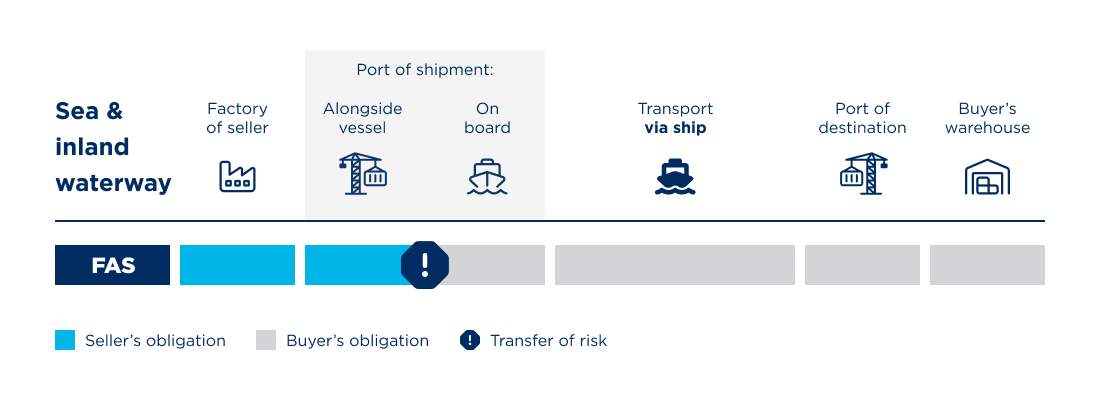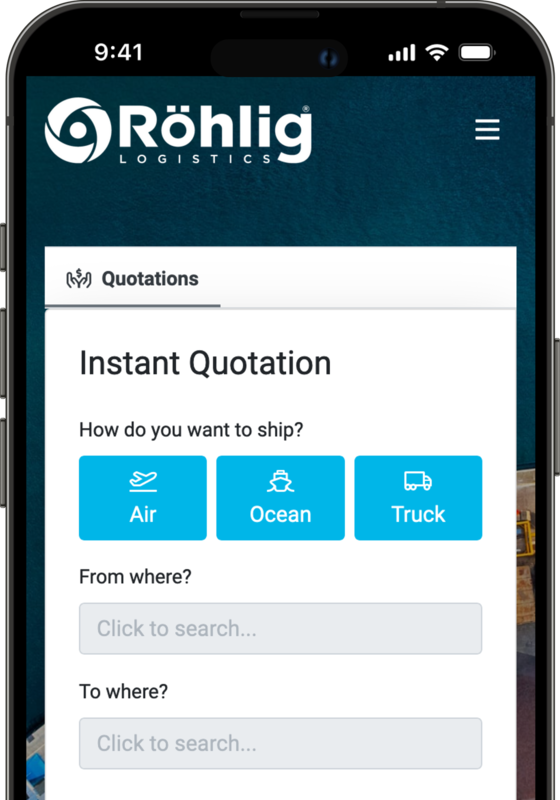The Incoterms have their origins in maritime trade. The FAS (Free Alongside Ship) Incoterm is one of the classic trade clauses that were part of the first Incoterms in 1936. Like FOB, CFR and CIF, FAS is only suitable for sea or inland waterway transport. With the FAS Incoterm, the goods are deemed to have been delivered when the seller either unloads them at a quay alongside the previously named transport ship in the previously named harbour or makes them available on the water side via alongside feeder ship - close enough for the ship to be loaded. The seller bears the costs for this transport. Furthermore, the seller can procure possession of the goods as part of a chain transaction (string of sales). Once the goods have been duly delivered on time, the risk and costs for onward transport are transferred to the buyer - starting with the loading of the transport vessel.
FAS: Ideal for general cargo and bulk goods
The Incoterm FAS is suitable for the transport of general cargo such as machinery, steel coils and bulky building materials or for bulk goods such as wheat, ore or coal, which are transported on a conventional cargo ship (as opposed to a container ship).
FAS Incoterm: Not recommended for container transport
When it comes to the transport of containers (whether FCL or LCL) via container ship, the problem for the seller is that the handling of the containers is out of their hands. The container is usually delivered to a terminal managed by shipping companies, port handling companies or quay operators. This means the seller is not able to fulfil the trade clause's condition that the goods be available alongside the ship. The terminal takes over the further handling process, while the seller bears the costs and risks, such as damage or delays.
For containers, choose the Incoterm FCA instead of FAS
Alternatively, we recommend using the Incoterm FCA (Free Carrier) for container transport. They are very similar in terms of the distribution of costs and risks. With both Incoterms, the seller is responsible for the transport to the specified handover point and takes care of the customs formalities for export (if necessary). Once the goods have been duly delivered, the buyer takes over. The buyer is responsible for onward transport, including costs, risks and formalities (e.g. for transit and import).
The problem for the seller of not bringing the container alongside the container ship is solved by the fact that with FCA, the handover at the terminal already fulfils the seller's delivery obligations. This results in a clear transfer of costs and risks. It also simplifies the scheduling of the transport.
Other alternatives for FAS are CFR and CIF
Regarding the container problem, the use of Incoterms CFR (Cost & Freight) and CIF (Cost Insurance Freight) can also be a solution, as the seller is responsible for loading at the port of shipment and transport to the port of destination. The seller bears the costs for the transport to the (ideally precisely defined) destination at the port of unloading.
The risk is transferred to the buyer as soon as the goods are on board, even if the seller bears the costs of transport to the port of destination and also takes out insurance with CIF (‘two-point clauses’).
FAS in Shipping: Specify the exact place of loading
To avoid ambiguity, it is advisable to specify not only the port of loading but also the specific loading point. If the loading point is not specified precisely, the seller will choose the location that is optimal from their point of view. Furthermore, the buyer should specify the specific ship that will take over the transport. The delivery must be made in a ‘customary harbour manner’. Generic goods such as wheat must be clearly segregated for the buyer. Furthermore, it must be possible for the goods to be taken on board without any problems, either through the ship's loading gear or through loading facilities on the quay. The buyer is responsible for organising the loading.
FAS: Duty of care for the seller
The transfer of risk to the buyer is ineffective if the seller breaches their duty of care, for example through inadequate packaging which later leads to damage.
FAS Delivery: Time of delivery
Both a fixed date and a period can be specified for delivery - the date within this period can be set later by the buyer (of course with a reasonable response time for the seller). If no exact date is specified, the seller has time until the end of the specified period.
FAS Delivery: Buyer's obligations in the event of delivery in accordance with the contract
The buyer is obliged to take delivery of the properly delivered goods - either themselves or via an authorised representative. The seller must provide proof of delivery in the form of a dock receipt or ship's receipt. If the ship intended for transport is late, has left before the agreed date or refuses to accept the goods delivered on time, the buyer is responsible for the consequences. If the buyer has not communicated the name of the ship, delivery time or loading place in good time, they must also bear the consequences.
Organisation of transport at FAS
The buyer is responsible for organising the transport of the goods after delivery by the seller. However, the seller can also take on this task. Depending on commercial practice, it may even be permissible for the seller to voluntarily and proactively conclude a contract of carriage at the risk and expense of the buyer. However, the seller must make an advance payment here and it is not certain that the buyer will accept the costs charged later.
FAS: Tips for insurance
The FAS Incoterm does not require either party to take out transport insurance. Nevertheless, it makes sense for the buyer and seller to insure the part of the transport for which they bear the risk. As with other Incoterms, it may also be advisable for FAS to take out comprehensive insurance, which the buyer and seller each pay for on a pro rata basis. This avoids damage occurring at the critical moment of the transfer of risk and the insurance companies seeing the other party as responsible for covering it.
The FAS Incoterm is only intended for sea and inland waterway transport, and here it is primarily suitable for the transport of general cargo and bulk goods. A different Incoterm such as FCA should be selected for the transport of containers (see above for more information). FCA comes closest to the FAS Incoterm in terms of the distribution of costs and risks between buyer and seller.
Responsibility for (further) transport costs and risks (loss, damage, etc.) is transferred to the buyer at the point in time when the seller delivers the goods alongside the named transport vessel at the predetermined loading point in the named port in accordance with the contract. This also applies if the designated transport ship has not yet arrived, has unexpectedly left earlier or refuses to accept the goods.
The seller is responsible for all formalities and costs incurred if a customs border is crossed. This includes, for example, export licences, security clearances, pre-shipment inspections and other official authorisations. The buyer, in turn, is responsible for import clearance and any transit through third countries. Both parties are obliged to support the other party with documents and/or information necessary for export, transit and import if required and upon request.


